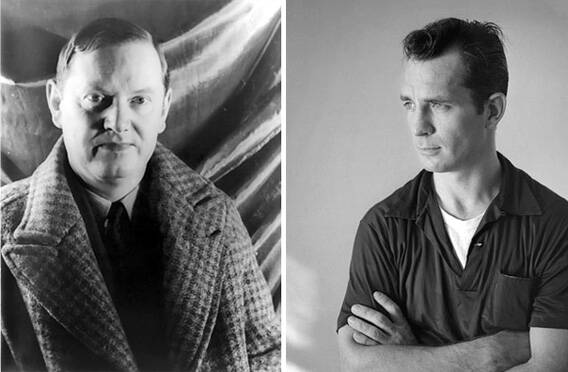An intriguing essay in Slate compares two writers who, one might be surprised to learn, not only lived in the same century but shared the same religion:
In the corner of the afterlife where they keep the Catholic alcoholic geniuses, Jack Kerouac and Evelyn Waugh are having a lovely time together—patting back and forth some kind of ethereal shuttlecock, reading aloud from Augustine’s Confessions and falling about laughing. ... That kind of thing.
Had the two men met here below, however, it is unlikely that the encounter would have been a success. The animus would probably have been on Waugh’s side: Kerouac, blowsy with Beat compassion, might—depending on his mood and booze level—have taken pity on the tightly trussed old fart of an English novelist. Waugh, on the other hand, we can imagine being quite merciless with the younger man, with his emotional incontinence, goofy transcendentalism and so on. Desperate drinking, on both sides, would have been assured.
But in the spirit, where it counts, these gentlemen were tragic brothers. Connective fraternal filaments ran invisibly between them, coursing with information, looping with special intensity around two of their books: Waugh’s The Ordeal of Gilbert Pinfold, and Kerouac’s Big Sur. Two novels, written five years apart, each a skimpily fictionalized account of a terrifying mental crack-up.
....
The real common denominator here, though, is courage: the courage of honesty, and the courage and cunning of the artist in the face of material that is aberrant, language-resistant, and fatally personal. Jack Kerouac had no choice but to let it all hang out: It was his compulsion and his destiny, “because if I dont write what actually I see happening in this unhappy globe which is rounded by the contours of my deathskull I think I’ll have been sent on earth by poor God for nothing.” So here was his naked and blubbering self, exposed, crashing through the panes of sanity in Big Sur. The less-than-compassionate Hunter S. Thompson called it a “shitty, shitty book.” Evelyn Waugh overcame the voices, finally, through strength of will and force of intellect. He subtitled The Ordeal of Gilbert Pinfold “A Conversation Piece,” relegating his nightmare to the realm of the merely interesting. Their methods were very different. Kerouac had his idiom of blurts and riffs, and his eerie feel for interdimensional slippage or “skidding”; Waugh his indomitable humor and Parnassian superiority of style. But each man, granted a holiday in madness, wrestled it back into a story: He incarnated it. Which might be rather Catholic after all.
You can read Jim Keane's essay on Kerouac in this week's Americahere.








